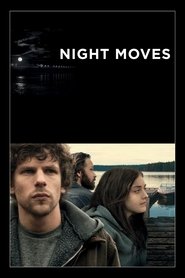— Like a spider I crept away and hid in my corner. I mean, you've been in my rat-hole, you've seen it… And you know, Sonya, low ceilings and cramped rooms cramp the soul and the mind, too!
— Fyodor Dostoevsky: Crime and Punishment (1866)
Bleak stuff. The more I ponder it in the days since I saw it, the more I feel the influence of Robert Bresson. The tense, quiet thrill as they hope they are not spotted in the canoe surely recalls A Man Escaped (1956); the post-screening reception of the pro-environmentalist movie brings to mind a parallel scene in the (equally bleak) The Devil Probably (1977); and the highly closed-off nature of the characters and that their motivations are only vaguely discernable through small clues is surely not a million miles away from Bresson's undemonstrative 'models'.
Another thought that springs to mind is actually a question: who are these three saving the world for? All three possess a shade of misanthropy in their different ways, and clearly self-serving reasons for committing their act. But they don't seem to envisage, however misguidedly, how their action(s) might actually help actual people. The man with nerve damage in his legs who wants to engage them in conversation is perceived solely as a threat, and not a darkly ironic reminder of "who they are fighting for". The case could perhaps be made that they are doing it for 'nature', but this lofty abstraction is ambivalently revered by the group based on their interaction with the roadkill.
Obviously, there's a huge difference between that favourite gotcha of the critics—the "unexplored plot point"—and the way that Reichardt fails to conclude the thread started when Josh thinks he overhears the other two together in the cabin. (Crucially to my eye, he leaves the food on the porch so that they know that he knows.) Not only does it freight their later goodbyes with layers of extra meaning, but it is surely a factor in Dena's later demise.
Similarly, there's a way that Reichardt handles the symbolism of the dead deer in a way that would otherwise be an overly clunky metaphor: a dead animal who is also pregnant is almost too on-the-nose, not least of all because it recalls Antonio Gramsci's famous line about "The old world is dying, and the new world struggles to be born." Still, does Josh cradle the deer in his arms and let loose a small tear from his eyes? No, his solution is simply to hide the deer out of sight, much like the trio would claim the world is doing about climate change. Now is the time of monsters indeed.
I can recommend Alex Lei's piece in Paste Magazine written on the 10-year anniversary of the film's release.
Thematic resonance[s] can be drawn from one of Reichardt’s greatest cinematic influences, Robert Bresson. While the thriller aspects of Night Moves clearly borrow language from A Man Escaped, its storytelling is more in line with the bleakness of Bresson’s last two films: The Devil Probably, about disaffected, post-‘68 existential young radicals, and L’Argent, a partial adaptation of Leo Tolstoy’s novella The Forged Coupon.
— Alex Lei (Paste Magazine)
They want to make a statement, but they are motivated by sentiment, rather than ideology; they’re not at all like the chattering students in Godard’s La Chinoise (1967), who recite Communist texts and long to attack establishment culture by blowing up the Louvre. Godard knew that the students’ means were idiotic, but he was on their side. His approach was both satiric and affectionate; Reichardt’s tone, by contrast, is glumly objective.
— David Denby (The New Yorker)
Josh, a pensive, mentally and geographically unmoored environmental activist [seems] to recede from our view the more we spend time with him.
— Michael Koresky (Reverse Shot)

